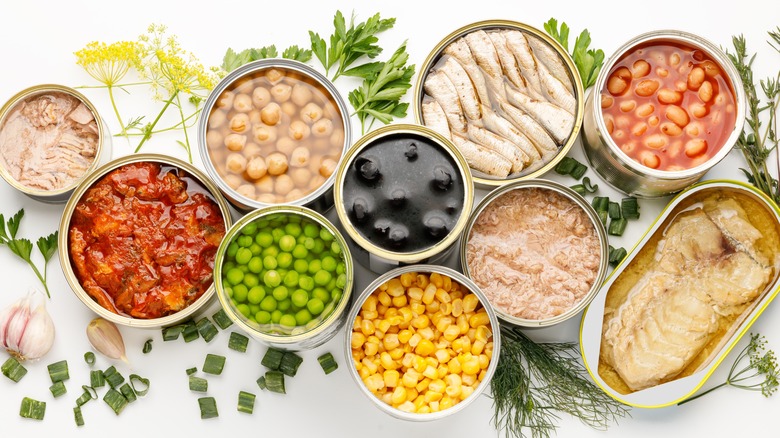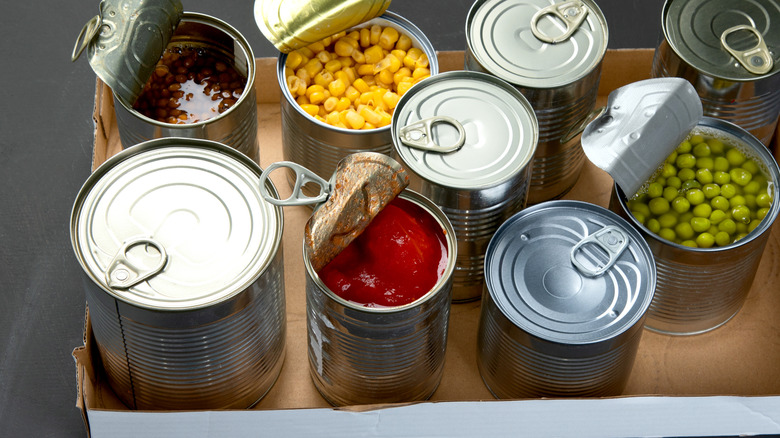How To Get Rid Of The 'Canned' Taste In Canned Vegetables
Canned foods are something you should always have on hand, a reliable resource for those days when you need a quick and easy meal, a substitute for out-of-season fresh foods, and of course, something to sustain you in your doomsday shelter. Capable of lasting for years on end and offering good value for your dollar, canned foods prioritize convenience and cost efficiency. But unfortunately, quality can fall by the wayside.
The taste and texture of canned goods are never going to match those of their fresh counterparts, something particularly notable in canned vegetables, being so far removed from their harvests. You may have noticed something off in the taste of canned vegetables — a metallic essence that throws the whole flavor profile out of whack.
The reason for this metallic taste lies in the canning process. Canned vegetables are packed in saltwater, which can pick up the flavor from the metal around it. This happens during the cooking process. Canned vegetables are actually cooked inside the can, after it has already been sealed (some are cooked twice, once before canning and once after). Cooking vegetables in the can entails heating the can under steam pressure. This is done at a low temperature, around 250 degrees Fahrenheit, although the cooking time can vary significantly depending on the type of vegetable. When all is said and done, the brine, as well as the vegetables themselves, are left with that metallic taste. Fortunately, there are ways to prevent this from affecting your meal.
You can try to extract the metallic taste
The metallic taste of canned vegetables can be concerning, but you generally don't need to worry about drinking dangerous amounts of metal. The USDA considers canned foods perfectly safe to eat, unless the can is rusted or severely dented. You should also watch out for very acidic foods, such as pickles and fruit, which can corrode the can if you don't use them by their expiration date. As long as your canned goods don't present those concerning features, you're good to go, and you can even extract some of that lingering metallic flavor with a quick and easy method.
To keep your meals from picking up metallic notes, try blanching the vegetables before you proceed with your recipe. To do this, simply drain the contents of the can to get rid of as much brine as possible. Then, dump the vegetables into a pot of boiling water and leave them there for two minutes before draining them once again and immediately plunging them into an ice water bath to halt the cooking process.
This should remove most of the unpleasant metal taste, but it may require another step to fully eliminate it. That's where your cooking skills come into play.
You can cover up the taste with seasonings
The most surefire way to get rid of canned vegetables' metallic taste is to mask it with a generous amount of seasonings (which you should really be adding to your food already so that it has, you know, flavor). Start with salt, which does a lot more than add salty flavor; it actually amplifies the collective seasonings in your dish.
Of course, you shouldn't stop there. We often glorify simplicity, but working with seasonings, particularly in this context, is one of those "more is more" scenarios. Strong flavors such as garlic, onion, cumin, cayenne pepper, and chili flakes benefit just about every savory dish, but they are especially useful when you're working with canned goods because they really come to the forefront of the flavor profile.
Citrus juices are also a great addition when you're looking to freshen things up. You can add them while you cook or drop a squeeze on the final product for even bolder flavor.


